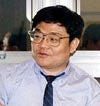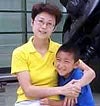Xu Zerong Receives 13-Year Sentence; Conditions of Detention Still Unknown
  Dr. Xu Zerong  |
Xu Zerong, detained on June 24, 2000, was sentenced in January 2002 by the Shenzhen Intermediate Court to a thirteen-year prison term on two separate charges. For "illegally providing state secrets" by sending reference material related to the Korean War (1950-53) to unknown parties overseas, he received a ten-year term. The additional three-year sentence was related to the accusation that he brought banned books into the mainland. The terms are to be served consecutively. An appeal is planned. Throughout his long academic career, Dr. Xu has written extensively about the Korean War. Nothing is known about the conditions under which Xu is being held, other than that officials say he is in good health. He has had no access to family members since he was first detained.
Human Rights Watch calls on the international community to continue to press for Mr. Xu's immediate release. It urges the Chinese government to "respect the freedom indispensable for scientific research" as guaranteed in Article 15 (4) of the International Covenant on Economic, Social and Cultural Rights which China signed in 1997 and ratified in February 2001.
Background
UPDATE July 28, 2001 — Dr. Li Shaomin and Dr. Gao Zhan have left China and were reunited with their families in the United States after their convictions on charges of supplying intelligence to Taiwan. Li was allowed to leave China on July 25 and Gao the following day, in a gesture widely perceived as an effort to improve China's relations with the United States. Tan Guangguang (also referred to as Qin Guangguang), another detained scholar, was also tried, convicted, and released along with Gao, but he remains in China. All three had significant links to the United States; Li was a naturalized U.S. citizen, while the other two were permanent residents.
Gao and Guangguang's trials on July 24 followed by ten days Li's trial and conviction, when prosecutors for the first time explicitly linked the cases. Beijing's No. 1 Intermediate People's Court, which heard the cases, convicted all three scholars after deliberating for only a few hours in each case. Li was expelled from China, while Gao and Tan were released on "medical parole."
While Human Rights Watch welcomes the release of these scholars, it denounced the numerous violations of Chinese and international standards of due process in the handling of their cases. Human Rights Watch also reminded the international community of other scholars, including Dr. Xu Zerong, who remain in detention in China as a result of their academic activity.
  Dr. Gao Zhan, released  |
UPDATE July 24, 2001— Dr. Gao Zhan, a U.S.-based sociologist. Gao, a U.S. permanent resident, was convicted in a closed trial on charges of collecting intelligence for Taiwan and sentenced to ten years in prison. She has applied for medical parole and could be expelled and returned to the United States ahead of a scheduled trip to China by U.S. Secretary of State Colin Powell on July 28. More..
UPDATE July 14, 2001— A day after China´s successful bid for the 2008 Olympics, Human Rights Watch condemned the trial and conviction in Beijing of Li Shaomin, a U.S. academic, on “espionage” charges. More..
UPDATE On July 10, China announced it will put Chinese-American academic Li Shaomin on trial for spying. The Foreign Ministry said Li would go before a Beijing court on Saturday. "The trial of U.S. citizen Li Shaomin will be declared open on the morning of July 14 at Beijing First Intermediate People's Court," spokeswoman Zhang Qiyue told a news conference. She said the trial would not be open to the public, but a U.S. consular official and a translator would be allowed to attend the hearings.
  Dr. Li Shaomin, released  |
UPDATE April 25, 2001 - Letter from Diana Li to President George W. Bush
April 3, 2001 - The Human Rights Watch Academic Freedom Committee today sent a letter to Chinese President Jiang Zemin to protest the detentions. Human Rights Watch was joined by other major scientific organizations in its statement, including the American Sociological Association and the New York Academy of Sciences Committee for the Human Rights of Scientists. The groups asked the Chinese government to clarify the reasons for its detention of these academics and to follow internationally recognized standards of due process.
"These detentions threaten all academics who do research in or about China," said Saman Zia-Zarifi, director of the HRW Academic Freedom program. "China needs academic cooperation with foreign universities and academics, and academic cooperation requires a reasonable level of security for scholars."
The Human Rights Watch Academic Freedom Committee is a group of prominent academic leaders and scholars, including Yuri Orlov, senior scientist at Cornell University and founder of the Moscow Helsinki Group, and Jonathan F. Fanton, former president of the New School for Social Research in New York. The committee membership includes the current and past presidents of Harvard University, Columbia University and over a dozen other universities in the United States, as well as internationally prominent academics such as Lord Ralf Dahrendorf of St. Antony's College at Oxford, Krzysztof Michalski of the Institute for Human Sciences in Vienna, Ariel Dorfman of Duke University, John Kenneth Galbraith of Harvard University, and Fang Lizhi of the University of Arizona.